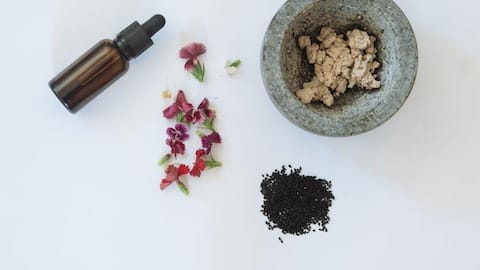Is natural always better? Expert weighs the pros and cons
What's the story
It's evident that "natural" skincare products are becoming more and more popular in recent years. Tapping into the healing properties of plant-based ingredients, natural skincare promises a harmonious relationship between your skin and the environment.
However, the debate persists: Is natural always better?
Dr Gayathri Rajesh, dermatologist/cosmetologist, Apollo Spectra Hospital, Chennai weighs on the pros and cons of natural skincare.
Boost antioxidant properties
Boost antioxidant properties
Proponents of natural skincare advocate for its use of botanical extracts, essential oils, and minimally processed ingredients. These elements often boost antioxidant properties, and soothing effects, and are perceived as gentle on the skin, says Dr. Rajesh.
According to her, many individuals with sensitive skin find solace in these formulations, experiencing reduced irritation and allergic reactions compared to their synthetic counterparts.
Sustainability
Natural skincare boasts sustainability
"Natural skincare products often prioritize sustainability and eco-friendliness, employing ethical sourcing and biodegradable packaging, contributing positively to both skin health and environmental preservation," says Dr. Rajesh.
Thus, choosing natural skincare leads to minimizing the environmental impact associated with certain chemical-laden alternatives.
This eco-conscious approach aligns with the principles of responsible consumerism and supports a more sustainable beauty industry.
Reactive
May cause adverse reactions
The expert cautions that labeling a product as "natural" doesn't guarantee its safety or effectiveness.
"The absence of standardized regulations regarding 'natural' poses a significant challenge," notes the dermatologist, expressing concern that this ambiguity can mislead consumers.
Natural ingredients, often potent allergens or irritants, may cause skin issues like dermatitis. Moreover, the lack of preservatives in such products raises the risk of bacterial contamination.
Less predictive
Less predictable outcome
As against natural skincare, synthetic skincare formulations undergo rigorous testing, ensuring precise concentrations and stability.
Ingredients like retinoids or certain acids, while not natural, have proven efficacy in addressing specific skin concerns such as acne or aging, Dr. Rajesh highlights.
"The controlled formulation process allows for a more predictable outcome, often yielding faster and more targeted results," she adds.
Conclusion
Final words
While natural skincare presents an appealing option for many, Dr. Rajesh reminds us that it is crucial to consider individual skin types, concerns, and sensitivities.
Consult a dermatologist for tailored skincare regimens, amalgamating the best of both natural and synthetic worlds.
Ultimately, the quest for optimal skincare entails a nuanced approach, recognizing the merits and limitations of both natural and synthetic ingredients.
